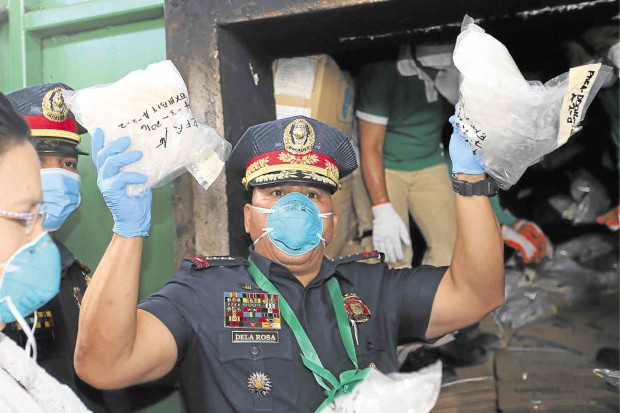‘Drug lords ordered hits’

HOT STUFF Philippine National Police Director General Ronald dela Rosa shows packs of “shabu” seized in several raids that became part of the P1.77 billion worth of illegal drugs destroyed by the Philippine Drug Enforcement Agency in Trece Martires City in Cavite province on Thursday. RAFFY LERMA
TRECE MARTIRES CITY—Director General Ronald “Bato” dela Rosa on Thursday said convicted drug lords were behind a rash of vigilante killings, directing hit men to target distributors who had run into difficulties remitting earnings following the Duterte administration’s intensified campaign against illegal drugs.
“For all you know, these drug syndicates, they’re now killing each other,” the Philippine National Police chief said at the burning of P1.77 billion worth of banned substances confiscated in police operations since February.
The incineration marked the first large-scale destruction of confiscated illegal drugs in more than a decade, underscoring President Duterte’s determination to put substance to his campaign promise to eliminate the drug menace in three to six months.
“You keep on looking at the police, you keep on suspecting us. But those behind these ‘salvage’ … these are the work of drug syndicates,” said Dela Rosa, adding the information came from a person who surrendered on Wednesday and sought police protection against a syndicate.
Dela Rosa, at the same time, dismissed allegations of extrajudicial executions in the police war against illegal drugs, saying the deaths were the results of “legitimate” police operations.
Article continues after this advertisementArticle continues after this advertisement
200 killed
In Davao City, Chief Supt. Camilo Cascolan of the PNP directorate for operations, on Thursday said deaths resulting from police operations required investigation by the Internal Affairs Service.
“Whatever happens in police operation, especially if there are people killed, there always has to be an investigation,” he said.
More than 200 people allegedly involved in the illegal drug trade have been killed since Mr. Duterte was sworn into office on June 30, according to a count by the Inquirer.
At least 64 of them were killed vigilante-style, while the rest were gunned down in police operations.
In dismissing allegations of police involvement in vigilante killings, Dela Rosa said drug syndicates, whose leaders are detained at New Bilibid Prison in Muntinlupa City, were calling the “hits” against their own “distributors.”
“Those inside Bilibid are now calling their hit men outside to kill their distributors for failing to remit money to the [leaders’] bank accounts, even as they continue to supply the goods. Onsehan (double-cross),” Dela Rosa said. This started as the police intensified its antidrug campaign, resulting in the mass surrender of drug users and pushers across the country, he said.
Dela Rosa was unfazed by reports that human rights advocates had started looking into the spate of killings under the Duterte administration.
“They can criticize [and file] complaints if there were abuses. We won’t cover them up,” Dela Rosa said.
“You cannot correct a mistake by making another mistake. It’s wrong to have drug dealings, you can’t [solve it] with extrajudicial killings,” he added.
He urged the police not to be discouraged by the investigations. “Continue the fight,” he said.
But he warned the so-called ninja cops—policemen suspected of “recycling” or reselling confiscated drugs—and others found to have links to the drug trade that they would be dealt with severely.
Earlier, Dela Rosa said the PNP would send erring policemen to the provinces of Sulu, Basilan and Tawi-Tawi to fight the bandit group Abu Sayyaf.
Philippine Drug Enforcement Agency Director Isidro Lapeña said Thursday’s event was the first time that illegal drugs confiscated by the PDEA and other law enforcement agencies were destroyed in a matter of days following their seizure or disposal.
Pilferage
“If we can do it faster, the better,” Lapeña said. “[Time] is very significant because the possibility of pilferage is reduced to maximum.”
PDEA personnel burned the drugs, with its bulk coming from the 180.9 kilograms of “shabu” (methamphetamine hydrochloride) dug up in the coastal town of Claveria in Cagayan province on July 3. Others were used as court evidence and disposed of by courts in Metro Manila and nearby provinces. It was the largest drug haul burned since 2004, when P2.3 billion worth of narcotics was burned, also in Trece Martires.
The drugs, in separate plastic bags, were placed inside a large metal chamber and subjected to intense heat in a process called “thermal decomposition.”
PDEA officials said this ensured that “reconstruction of the substances is impossible.” With a report from Allan Nawal, Inquirer Mindanao